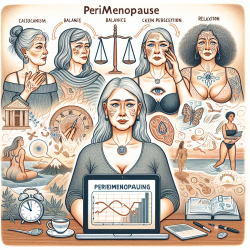Perimenopause is a significant period in a woman's life that often brings unpredictable changes to menstrual cycles and overall wellbeing. According to the research article "Perimenopausal women’s voices: How does their period at the end of reproductive life affect wellbeing?" by Ray, Maybin, and Harper, perimenopausal women experience a range of physical and emotional challenges that can significantly impact their quality of life. Here’s how you, as a practitioner, can implement the outcomes of this research to improve your skills and better support your clients.
Understanding the Impact
The study revealed that perimenopausal women often face unpredictable, heavy periods that disrupt their daily lives. The unpredictability can lead to anxiety, inconvenience, and embarrassment, especially in public or professional settings. Many women also experience intensified premenstrual symptoms, such as mood swings, irritability, and depression.
Key Takeaways for Practitioners
To better support perimenopausal women, consider the following strategies:
- Enhanced Communication: Encourage open discussions about menstrual health. Normalize the conversation around periods and perimenopause to reduce stigma and anxiety.
- Workplace Support: Advocate for flexible work arrangements and policies that support women experiencing perimenopausal symptoms. This includes allowing work-from-home options during heavy periods or providing a supportive environment where women can openly discuss their needs.
- Comprehensive Education: Promote comprehensive menstrual education in schools that includes both boys and girls. This early education can foster a better understanding and empathy towards menstrual health issues.
- Training for Healthcare Professionals: Push for mandatory training on women’s health issues, including menopause and perimenopause, for healthcare providers. This ensures that women receive informed and empathetic care.
- Support Networks: Encourage the formation of support groups where women can share their experiences and receive emotional support from peers going through similar challenges.
Encouraging Further Research
While this study provides valuable insights, there is always room for further research. Practitioners should stay updated on the latest findings and consider participating in or supporting additional studies to continue improving the support available to perimenopausal women.
To read the original research paper, please follow this link: Perimenopausal women’s voices: How does their period at the end of reproductive life affect wellbeing?










